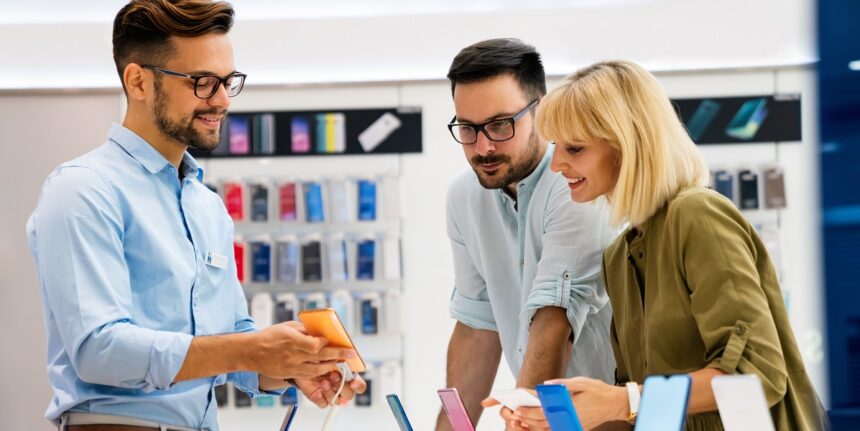Explore the latest retail trends and tech-led solutions in this three-part series. In part one, we explore how leading retailers and brands are leveraging tech and analytics to boost operational efficiency, and craft irresistible in-store experiences for tomorrow’s consumer, today.
Consumer behaviors’, and their expectations from brands and retailers, are never returning to “normal”. To compete in the post-pandemic, Tech and Durables retailers must actively embrace retail analytics trends and technologies that may previously have seemed optional.
But while some retail tech trends in 2023 may seem too futuristic to be practical, that’s not always the case. In part one of this three-part series, we share real-world examples of retailers and brands who have incorporated the latest trends in the service of everything from “retailtainment” to in-store experience optimization and retail operational efficiency.
Upgrade the in-store experience by design: Retail interactivity, digital signage, and digital kiosk
Our Consumer Life research shows, “41% consumers state that it’s important to indulge or pamper myself on a regular basis”. Delivering best-in class retail experience could cater to the need to be heard by the consumers; by improving retail interactivity and offering personalized in-store experiences. By doing so retailers can improve:
- Overall consumer experience and brand perception,
- Increase in-store dwell time,
- Attract target groups to trigger purchases,
- Enable proximity-based marketing.
A leading toy production company is continuing to break ground in this area, blending unique digital and physical experiences to create an immersive world that delights children and adults alike. In-store interactive displays and installations engage consumers throughout their journey — from entry to product test or exploration, and purchase. For example, installations transform the usually mundane act of waiting in line for a teller into an entertaining experience, complete with a fun, brand-appropriate game. Product demo experiences also reach new heights in-store, with visitors given the ability to use the product in real-time. This can involve building something unique out of the product, scanning the results, and being shown a tailored animation that can be virtually engaged with.
![]()
Meanwhile, a global digital signage company has pioneered digital kiosk that enable consumers to self-serve with modern, personalized in-store experiences. These experiences nevertheless offer the same speed and convenience as an online purchase. Using this digital kiosk an instore customer can speak to a product expert. The product expert can be situated instore in the backend room or in regional headquarter store. It also benefits retailers: allowing stores to distribute expertise broadly while optimizing employee store count and ensuring expert consulting is always available for customers. This removes the location limitation of a product expert and allows them to cater to broader customer base.
The increasing presence of interactive displays and animated, digital signage is just a drop in the ocean when it comes to creating irresistible in-store experiences. Future-forward retailers who become comfortable with combining multiple technologies together in brand-appropriate ways can create a broader appeal for their target audience, stand the best chance of becoming leaders in consumer perception and innovators amongst their peers.
Optimizing in-store experiences and back-office planning: Leveraging customer flow trends and optimization to boost retail operational efficiency
Camera and sensor technology allow retailers to monitor consumer and employee actions to reduce theft and fraud, and track product selection. One innovative retail technology brand is shifting the narrative from reducing risk to improving customer experience, by highlighting the retailer benefit of integrating this technology in store. Using a combination of sophisticated tools, you can determine who took what from your store, and offer consumers the opportunity to walk into the store, select their products, and walk out immediately. Payment can also be more convenient, with charges being automatically applied to their account after they have left the store.

Designed for new store builds, or installed as part of a remodel, retailers who invest can leverage this scalable, flexible technology to:
- Increase sales per square foot by refining layout and sales strategies based on new insight into how products are considered and purchased,
- Improve operational efficiency by scheduling staff where they are most needed, and refining production and inventory levels to shrink waste,
- Boost consumer loyalty by offering a fast, convenient way to shop,
- Operate with confidence by relying on the built-in security, reliability, and technical support of the global, Billion-dollar brand.
For retailer choosing not to opt for such high capital investments you don’t need not be that complex. Even just collecting and analyzing shopper flow count data, for example, is helping retailers understand customer flow trends and use this information to: identify store hotspots, improve in-store experience, and optimize store layout and shelving to avoid long queues and best place high-value products.
Customer flow management software is already available to retailers ready to improve in-store experiences without intruding on anyone’s privacy. By using interconnected 3D sensors to determine the exact number of visitors and various metrics in real time, retailers can better:
- Understand the path to purchase, including dwell time and view direction
- Adapt product arrangements based on data-driven insights
- Move high-margin products to top locations and increase sales
- Differentiate between engaged shoppers and passersby
- Access real-time data about-in-store performance
While retailers gain unprecedented insight into consumer gender classification, the frequency and time of their visits, and more, potential violations of GDPR and other privacy laws can be minimized. For example, some leading software providers no longer store a visual feed. Instead, metadata from the visual feed is pushed to the database to inform retailer insights and the visual feed is deleted.
Pre-requisites to implementing retail technology solutions
There are many options to enhance the retail experience but a pre-requisite to those changes would be:
- Retailers need to focus on getting their data schemas organized.
- They would need to prepare and train the retail store colleagues appropriately.
- Evaluate the store readiness before implementing these technologies.
- Since these technologies are capital intensive, they need not be rolled out in all stores, or at the same time everywhere. So appropriate pilot stores need to be chosen for this purpose.
- Pilot store which are chosen needs to be in area where consumer is tech-savvy consumer or consumer open to such changes are a dominant shopping base, so that consumers don’t feel alienated by the sudden technological shift which has occurred in-store.
- All these changes will help in the adoption of retail technology and leveraging data to achieve better in-store performance and offer better customers experience.
Take data-driven decisions to accelerate your retail business
Staying up-to-date on industry trends and developments contributes to sustainable growth, but in today’s fast-paced and highly competitive landscape, Tech and Durables brands and retailers must go one step further to succeed.
Get 360° connected retail analytics insights that augment your own internal data to help you answer key business questions on your market position, channel and category pricing, future demand and more.
Click here to explore the GfK’s Data Partners Program and get free access to market data from some of the world’s biggest sales panels to unlock unprecedented depth of insight into consumer behavior and the future of retail.
Be the first to get breaking industry news and expert insights into the latest trends in retail.









